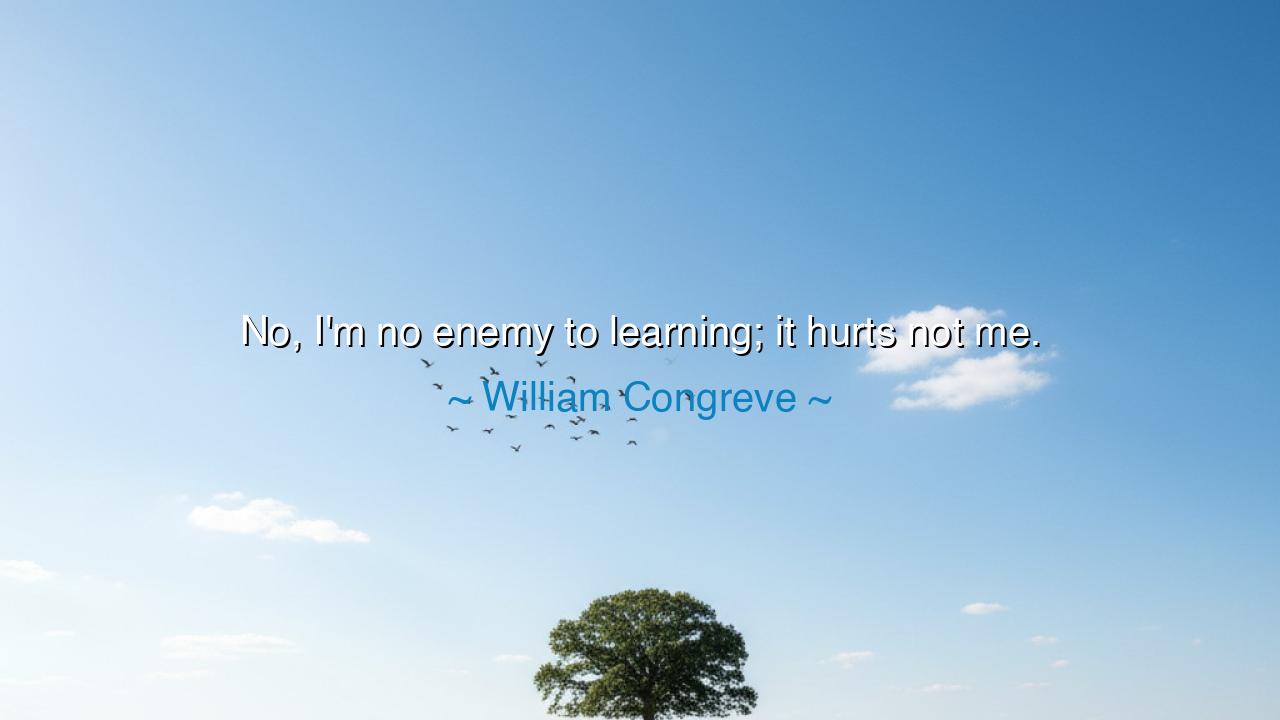
No, I'm no enemy to learning; it hurts not me.






When William Congreve wrote, “No, I’m no enemy to learning; it hurts not me,” he spoke with the eloquence of a man living in an age when wit was prized, intellect admired, and words themselves wielded like swords. Beneath the charm of this simple phrase lies a defense of wisdom against arrogance, and of knowledge against fear. Congreve, a playwright of the English Restoration, was surrounded by a society that often mocked scholars and prized style over substance. Yet he, a man of wit and reason, declared that learning is no enemy to the spirit, no threat to happiness or pride. On the contrary, it sharpens, enlightens, and refines — it “hurts not” but heals.
In the style of the ancients, we might say that Congreve’s words echo the wisdom of the philosophers — those who believed that the mind, once opened to knowledge, can never return to ignorance. The phrase may sound defensive, even ironic, as if spoken in response to those who mocked education as tedious or pretentious. In truth, it is an affirmation: that knowledge, when pursued with humility, is never harmful. It does not wound the heart nor burden the soul. The only pain it brings is the ache of awakening — the realization of how much one has yet to learn. Such pain is holy, for it transforms the ignorant into seekers of truth.
The ancient Greeks held that to learn is to heal the blindness of the soul. Socrates called ignorance the only true evil, and education the cure for it. Yet even in his day, as in Congreve’s, there were those who feared learning — fearing it would unsettle comfort, question authority, or diminish pleasure. Congreve stood against that fear. His phrase reminds us that learning is no tyrant, but a liberator. The wise do not flee from the discipline of the mind; they embrace it, for the mind that grows through study grows also in peace. Knowledge, rightly held, humbles rather than hardens.
Consider the story of Galileo Galilei, who faced condemnation for daring to claim that the Earth moves around the Sun. Many around him, afraid of new ideas, treated learning as an enemy — as something dangerous and subversive. But Galileo knew that truth cannot harm the soul; only the refusal to seek it can. “It hurts not me,” he might have said, for though his discoveries brought him exile and scorn, they also brought him freedom of spirit. His courage to learn in the face of fear stands as a living embodiment of Congreve’s wisdom — that learning, even when it wounds pride or comfort, does not destroy; it enlightens.
And yet, Congreve’s words also carry a note of irony, the playful wit of a man too clever to moralize plainly. He belonged to an age of rhetoric and elegance, where poets and thinkers sparred with words. To say that “learning hurts not me” could also be a jest at those who brag of ignorance — a subtle mockery of the fashionable fools who despised scholars but secretly envied them. It is as if he were saying, “I am not harmed by wisdom, though others may find it too heavy for their heads.” Thus, the phrase becomes both a confession of intellect and a satire of anti-intellectual pride.
In every generation, there are those who scorn learning — who think study is dull, or humility beneath them. But Congreve reminds us that wisdom never wounds the soul that welcomes it. Ignorance may be easy, but it is a fragile peace, built on darkness. Learning, even when it challenges, strengthens the mind as fire tempers steel. The discomfort of growth is not pain, but purification. It strips away vanity, softens arrogance, and opens the heart to understanding.
The lesson, then, is clear: embrace learning without fear. Let no man tell you that curiosity is a burden or intellect a vice. Read widely, listen deeply, question boldly, and grow humbly. Accept that wisdom may unsettle you, but know that it will never harm you. Be like Congreve — confident in the belief that knowledge refines, not ruins; that truth, however demanding, frees rather than confines.
So remember this, dear seeker: learning hurts not — it heals. It is the forge where the rough metal of the mind is shaped into something enduring and bright. To be “no enemy to learning” is to be a friend to your own becoming. And in that friendship lies the greatest gift of all — a life both awakened and alive, ever-growing in light and in understanding.






AAdministratorAdministrator
Welcome, honored guests. Please leave a comment, we will respond soon